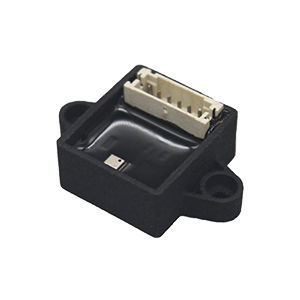
Pressure sensor PGS4100humidityconductivitygas
Add to favorites
Compare this product
Characteristics
- Evaluation type
- pressure, humidity, conductivity, gas, hydrogen
- Applications
- medical
- Pressure range
Min.: 30,000 Pa
(4.35 psi)Max.: 120,000 Pa
(17.4 psi)
Description
The PGS4100 series of hydrogen sensor detects hydrogen concentration in air by measuring the change in thermal conductivity of the gas mixture. Hydrogen and air have very different thermal conductivity. Variations in hydrogen concentration result in significant changes in the thermal conductivity of the gas mixture. The PGS4100 series has incorporated a relative humidity sensor and a barometric pressure sensor to compensate for thermal conductivity changes caused by the presence of humidity in air and by elevation. Humidity and pressure compensation make the PGS4100 more accurate in hydrogen concentration measurement, allowing it to comply with industry standards for flammable gas detection. The PGS4100 series uses Posifa's secondgeneration thermal conductivity die, packaged in an SMD form factor. The sensor is excited with a pulsed waveform (400ms on and 1000ms off), resulting in a heater temperature that is almost the same as the ambient, lending intrinsic safety to the sensor. Posifa's thermal conductivity sensor has been tested with long term exposure to harsh environments, including hundreds of thermal cycles and freezing. It has shown excellent stability and robustness. The PGS4100 series supports voltage analog and I2C digital output. In the future it will support MODBUS/UART and CAN bus. The PGS4100 is housed in a IP6K9 compliant enclosure with a wire harness that is terminated with an automotivegrade connector for enhanced durability.
FEATURES
• Humidity and pressure compensated.
• Remains accurate in harsh environments
• Non-reactive to "poisons" or contaminants
• Long term stability
APPLICATIONS
• Hydrogen leak detection
Catalogs
No catalogs are available for this product.
See all of BS-rep GmbH‘s catalogsRelated Searches
- Medical probe
- Temperature probe
- Monitoring probe
- Gas probe
- Analyzer for the pharmaceutical industry
- Temperature analyzer
- Pressure sensor
- Flow probe
- Oxygen probe
- Humidity probe
- Process probe
- Anesthesia equipment probe
- Conductivity probe
- In-line analyzer
- Mass flow sensor
- Ultrasonic analyzer
- Bubble point analyzer
- Hydrogen sensor
- Vacuum pressure sensor
*Prices are pre-tax. They exclude delivery charges and customs duties and do not include additional charges for installation or activation options. Prices are indicative only and may vary by country, with changes to the cost of raw materials and exchange rates.


